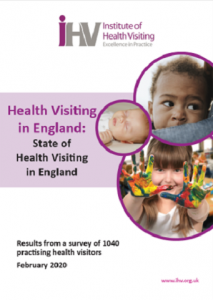20th February 2020
Public health budget cuts have left health visiting services unable to offer the minimum level of support in many areas
Many health visitors across England have been robbed of their ability to protect vulnerable families by devastating cuts to public health budgets. That is the headline finding of an annual survey of health visitors in England, published today by the Institute of Health Visiting (iHV), alongside calls to ring-fence new funding for the profession.
Released just days after the Duchess of Cambridge highlighted the importance of a secure childhood for future health and wellbeing, the iHV State of Health Visiting survey indicates that those professionals best placed to help children get the best possible start in life lack the resources to do so.
Official figures indicate that around one in five health visitors were lost between 2015 and 2019 – the full-time equivalent of 18% of the workforce. This is due to public health budget cuts and the failure to protect health visitors’ preventative role by many cash-strapped local authorities, after health visiting commissioning moved from the NHS to local authorities in 2015.
The consequences can be devastating, with 48% of health visitors saying they feel so stretched that they fear a tragedy where they work.
As one health visitor told the iHV: ‘Larger caseloads and fewer staff mean families are not getting a tailor-made service to meet their needs. Vulnerable children are slipping through the net.’
Almost a third of health visitors report they are now responsible for between 500 and over 1000 children. Meanwhile, the iHV considers the optimal maximum to be 250 children in order for health visitors’ work to be fully effective, less in areas of high vulnerability. Consequently, 58% of health visitors are working long hours and feeling ‘worried’, ‘tense’ and ‘anxious’.
One health visitor said: ‘I have taught myself to become numb to what is happening within health visiting – as a coping mechanism.’
The iHV is calling for urgent action to address this crisis – before more damage is done.
Dr Cheryll Adams CBE, Executive Director of iHV, said:
“It is absolutely unacceptable that many families are struggling through the significant demands of early childhood without the vital support that they need and are entitled to through the government’s flagship Healthy Child Programme. Indeed, the government’s pledge to give every child the best start in life has been left in tatters after year-on-year cuts to the public health grant, which have dismantled the health visiting services designed to support them in many areas.”
The Institute is calling for:
- New ring-fenced cross-government funding for early intervention and the health visiting profession.
- Statutory protection for the health visitor role in leading the delivery of the Healthy Child Programme and for health visiting to be returned to statutory regulation.
- Workforce modelling and a new workforce strategy for health visiting.
- A new focus on improving the quality of services which health visitors can offer families, regardless of where they live.
Dr Adams continued:
“Our survey indicates that health visitors have seen rising demand for support from families, almost certainly related to austerity. Meanwhile, they themselves have battled with ever increasing caseloads, due to the fall in health visitor numbers. It was particularly disturbing that one in four health visitors told us that they are seeking professional help from a GP or elsewhere, due to the demands of their job.”
“Health visitors worry about children being at risk and there is no doubt that their stress levels directly related to them feeling unable to deliver the quality of service that they know they can – and should be able to – offer, as well as the fear of children’s needs being missed. Our children are our future. They deserve much better than this.”
The headline findings of the iHV State of Health Visiting survey are:
- Only 21% of health visitors rated the quality of care that they can now offer families as ‘good’ or ‘excellent’.
- 48% of health visitors said they feel so stretched that they fear a tragedy where they work. This is up from 23% in 2015, which even then suggested a profession under pressure.
- 29% of health visitors are now responsible for between 500 and more than 1000 children.
- While in 2015, 65% of health visitors were able to offer continuity of carer to all, or most, families, by 2019 that number had fallen to just 35%. Continuity of carer has been shown to be greatly valued by parents and health visitors, as it allows them to build a trusting relationship and gives parents confidence to ask for help.
- 58% of health visitors reported that they are working longer hours and are feeling worried, tense and anxious.
- 36% of health visitors said they would leave health visiting if they could.
- Despite being mandatory, only 34% of health visitors reported that they were able to offer an antenatal contact to families.
- 81% of health visitors reported that they are not conducting 12-month reviews of children and 90% were not completing the 2 to 2.5-year review. This directly contradicts government’s call to reduce the language gap. These essential checks are most frequently delegated to more junior members of staff. This means that many families will not see a health visitor after their infant is 6-8 weeks old – especially with the closure of many child health clinics alongside the cuts to health visiting numbers.



